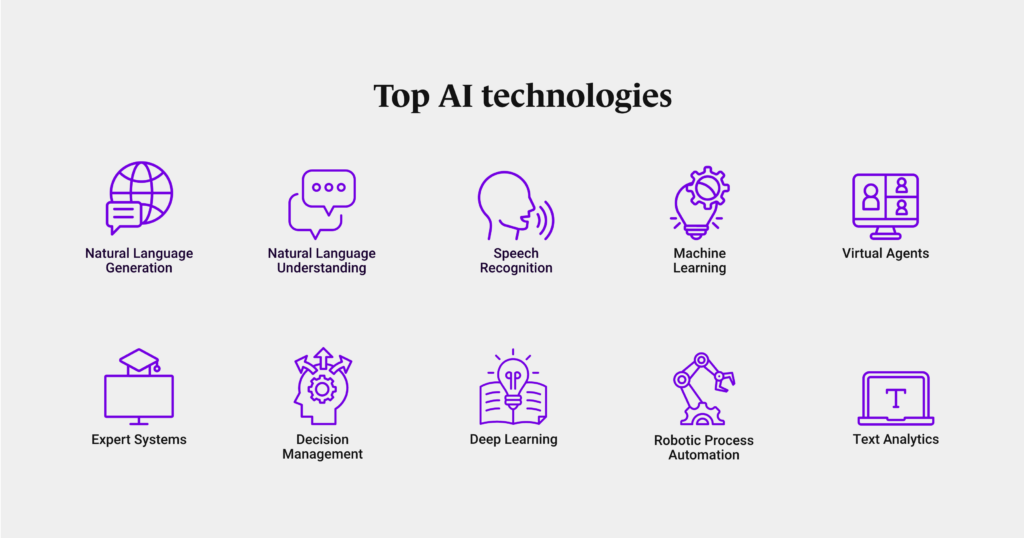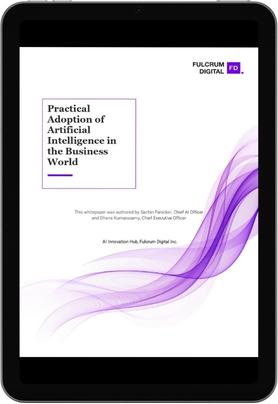In today’s fast-evolving digital landscape, businesses are promptly turning to Artificial Intelligence (AI) and Machine Learning (ML). Predictive analytics, computer vision, generative AI, AI model assessment, natural language processing (NLP), and cloud-based AI solutions have become indispensable tools for gaining a competitive edge. These technologies have the potential to revolutionize industries, improve operational efficiency, and drive innovation.

Businesses can extract valuable insights from vast amounts of textual data, automate customer interactions, and enhance decision-making processes. Developing an effective strategy to leverage these technologies, however, requires careful consideration of several key factors.
1. Understand your business objectives
Like any technology, AI/ML implementation mandates a clear strategy. Define the problems you aim to solve, the outcomes you want to achieve, and how AI/ML can support those goals. AI/ML solutions are not “one-size-fits-all.” Identifying your business needs helps prioritize the right projects to maximize your investments. For instance, a retailer should leverage AI to optimize inventory management and personalize customer experiences based on buying patterns. Take a leaf out of Airbnb’s book – they use NLP techniques to analyze customer reviews, uncovering insights to enhance the user experience.
2. Identify relevant AI/ML use cases
Identifying the best AI/ML use cases for your business is vital. Look for areas where AI/ML can make a substantial impact, such as customer service automation, predictive maintenance, demand forecasting, or fraud detection. Consider the potential ROI, scalability, and feasibility of each use case. Netflix, for example, utilizes AI algorithms to recommend personalized content to its users, increasing customer satisfaction and engagement. Meanwhile, Twitter employs NLP algorithms to detect and filter offensive or abusive content, ensuring a safe and positive user experience.

3. Leverage NLP frameworks and tools
To streamline NLP implementation, leverage existing NLP frameworks and tools. Open-source libraries like NLTK, SpaCy, and Transformers provide a wide range of NLP functionalities, including text pre-processing, entity recognition, sentiment analysis, and language translation. Pre-trained models, such as BERT (Bidirectional Encoder Representations from Transformers) and GPT (Generative Pre-Trained Transformer), offer a head start on NLP tasks. Amazon, for example, uses NLP techniques to enhance product search and recommendations, delivering more accurate and personalized results to customers.
4. Assess data availability and quality
A solid data-driven foundation lies at the core of any successful AI/ML strategy. Similarly, NLP models heavily rely on high-quality, labeled data for training and validation. IBM reports 80% of AI projects fail to scale due to poor data quality or governance issues. Assess the availability and quality of your data to determine its suitability for AI/ML initiatives. Adobe, for example, leverages AI/ML to analyze customer data and provide actionable insights to marketers for effective campaign targeting. Yelp utilizes NLP techniques to analyze user-generated reviews, enabling them to provide accurate restaurant recommendations based on sentiment analysis and other factors.

Data powers AI/ML algorithms. Ensure you have enough diverse and relevant data to train and test your models effectively. AI/ML initiatives succeed with a robust data infrastructure. Furthermore, Data hygiene is crucial; poor-quality data can result in inaccurate predictions or biased outcomes.
5. Build or acquire the right talent
Building a successful AI/ML or NLP strategy requires a team of skilled professionals. Evaluate your existing talent pool and determine if additional expertise is needed. Data scientists, machine learning engineers, and AI specialists are in high demand. Consider whether to build an in-house team, hire external consultants, or collaborate with AI-focused start-ups. For instance, Google hired top AI researchers and invested in start-ups like DeepMind to accelerate their AI capabilities. IBM Watson offers NLP services and APIs that businesses can leverage to accelerate their NLP capabilities.
PRACTICAL ADOPTION OF AI IN THE BUSINESS WORLD
Discover the path to seamlessly integrate artificial intelligence into your business operations in this comprehensive whitepaper.

6. Leverage cloud-based platforms and tools
Cloud platforms offer scalable infrastructure and pre-built AI/ML services, reducing implementation complexity and cost. Providers like Amazon Web Services (AWS), Google Cloud, and Microsoft Azure offer a wide range of AI/ML tools and frameworks. By leveraging these platforms, businesses can focus on developing and deploying AI/ML models quickly. Spotify utilizes Google Cloud’s AI/ML services to analyze user preferences and provide personalized music recommendations.
7. Ensure ethical and responsible AI/ML/NLP practices
Ethics and responsibility should be at the core of your AI/ML strategy. Ensure your models are transparent, explainable, and comply with regulatory requirements. Guard against bias and discriminatory outcomes by diversifying your data sources and conducting rigorous testing. Take inspiration from OpenAI, which has developed frameworks to address concerns about AI bias and promote responsible AI development. Google, for instance, has implemented AI guidelines and review processes to ensure ethical and unbiased NLP applications, such as Google Translate.

Conclusion
Building an effective AI/ML/NLP strategy requires a holistic approach that aligns with your business objectives. It involves complex and interconnected steps that include understanding your business needs and assembling the right team and technology. It identifies relevant use cases, assesses data availability and quality, coalesces the right talent, leverages cloud platforms, and tools, and embraces ethical practices.
By considering key factors such as data infrastructure, technology selection, and team development, you can develop a robust AI/ML/NLP strategy. Businesses can harness it to drive innovation, enhance decision-making, and stay ahead in today’s data-driven world. Remember, the success of your AI/ML/NLP strategy lies in understanding your unique business needs and leveraging the latest advancements to unlock new opportunities.





